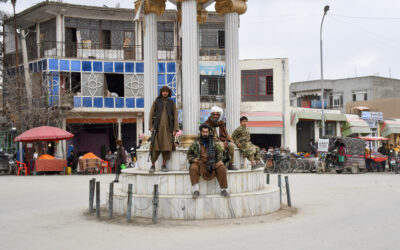In the self-created mythical world that Donald Trump has conjured up through his GOP presidential nomination campaign, the Islamic State terrorists will be gone “very, very, quickly” should he be sworn in as President and Commander-in-Chief next January 20.
“Their days are numbered,” he told a Washington audience last Wednesday during his long awaited, disjointed foreign policy speech. “I won’t tell them where, and I won’t tell them how, but they are going to be gone, and soon.”
The very next day, Defense Secretary Ash Carter told the Senate Armed Services Committee exactly how the Obama administration was carrying out the fight against ISIL [its name for the Islamic State], how much it was costing, the problems still to be faced, and how long it was going to take.
The gap between Trump’s myth and Carter’s reality could not be presented more clearly – if only the voting public had a chance to see it.
Trump has repeatedly said he won’t describe his plan to defeat ISIL, because he wants his actions to be “unpredictable.” He also implies that the U.S. will be doing it alone, and then withdrawing – but of course if the plan is secret to surprise ISIL, he doesn’t have to describe any details, leaving allies and the American public also in the dark.
On Fox News Sunday, he repeated the simplistic idea, “We’ve got to knock off ISIL, and we’ve got to at some point get out of there, because we have to rebuild our country.”
Carter, on the other hand, appearing before Congress and the public, went into specifics, such as the past work that has gone into creating a coalition of trained, “motivated local forces” in both Iraq and Syria, supported financially, and with air and ground military assistance from NATO and Gulf area nations.
Trump, of course, has regularly criticized those same NATO countries and the Gulf states, and particularly Saudi Arabia, for not paying for present and past U.S. security protection to them. He apparently may not know about the contributions to the American-led efforts against ISIL and al Qaeda in the Middle East made by these U.S.-allied nations he’s constantly dumping on. And he certainly never acknowledged the help they have provided to the common effort.
Trump’s claim for understanding the Middle East comes from his oft-repeated but false claim that he opposed the George W. Bush administration’s 2003 invasion of Iraq before it took place. In fact, his alleged opposition to the invasion publicly came in 2004, almost a year after the war had begun and U.S. forces in Iraq had run into problems.
Carter’s testimony last week before the Senate panel really should be required reading for Trump. Ironically, Sen. Jeff Sessions (R-Ala.), a member of the Armed Services Committee and chairman of Trump’s National Security Advisory Committee, was not present to hear Carter and Joint Chiefs Chairman Joseph Dunford Jr., who also testified.
While Trump and other Republican politicians continually claim that the administration has “no strategy,” Carter spelled out to the committee the three elements of Obama’s operational strategy as they apply to ISIL and the overall Middle East.
The first is directed at “destroying ISIL’s parent tumor in Iraq and Syria, which is necessary, not sufficient, but necessary,” Carter said. The second was “combating the metastasis of the ISIL tumor worldwide, where ever they appear,” and the third, “our most important mission, which is to help protect the homeland.”
Carter said the overall strategic approach “is to enable capable, motivated, local forces to recapture and then hold and govern territory tyrannized by ISIL.”
The key to the current strategy is not just Trump’s getting rid of the ISIL, but rather to create local forces that can “hold and govern” areas so that no other terrorist group could take over.
“Enabling local forces, not substituting for them, is necessary to ensure a lasting defeat. And sometimes that means our pace is predicated on the speed at which local forces can absorb our enabling,” Carter said.
The Defense Secretary provided details that showed how complex and time consuming current operations were, and that more time would be needed for those planned for the future – matters that Trump conveniently ignores.
Iraqi Security Forces, along with Kurdish Peshmerga fighters – not known for collaborating together unless with U.S. or allied assistance – required almost a year of preparation but now “have begun operations to isolate and pressure Mosul, with the intent to collapse ISIL’s control over that city,” Carter said.
In Syria, Carter said, “capable and motivated local forces supported by our coalition retook” areas that cut off “one of the last major northern arteries between Raqqa [ISIL’s caliphate headquarters] and Mosul, and therefore between ISIL in Syria and ISIL in Iraq.”
These steps have been bolstered by months of “targeting ISIL’s leaders and finances,” the capture of “one of the principals ISIL’s chemical warfare enterprise,” and continued “attacks on ISIL’s economic infrastructure from oil wells and trucks to cache storage.” Together they have been “putting a stranglehold on ISIL’s ability to pay its fighters, undermining its ability to govern and making it harder to attract new recruits,” he said.
These advances didn’t happen overnight. Carter said. “We’ve trained over 20,000 Iraqi security forces and provided six full brigades sets of equipment to the Iraqi army, and we provided two brigade sets to the Peshmerga, part of more than 12 million pounds of critical supplies donated by more than 20 countries,” including many of those Trump has criticized.
The U.S. is planning its own additional financial assistance to the Kurdish Peshmerga—up to $415 million—and another $349 million to train and equip other vetted Syrian forces.
Meanwhile, Carter said he was looking for more assistance from allies. At an April 21 Gulf Cooperation Council meeting in Riyadh, Carter said he “emphasized the importance of their countries doing more, not only militarily, as Saudi Arabia and the U.A.E. have been doing, but also politically and economically.”
At a countering-ISIL session with other defense secretaries this week in Stuttgart, Germany, Carter will be convening “fellow defense ministers from the major contributors to the military campaign to discuss ways we can all continue to accelerate our efforts.” He also said he would raise the “political, economic and diplomatic challenges in both Iraq and Syria affecting the pace of the military campaign.”
Trump made clear last Tuesday that he has no interest in “nation building,” although in one of many contradictions, he said the U.S. should nevertheless play a role in “stabilizing” the area.
Carter, however, pointed out realistically that lasting military defeat of ISIS will only be secured if it is “matched with political and economic momentum” within the involved countries. That calls for the U.S. and other nations to provide foreign assistance in one form or another – which for better or worse has been tagged as “nation building.”
Whether Trump likes it or not, the U.S., as the world’s richest and most powerful country, must play a leadership role worldwide. His “America First” slogan should relate not just to taking care of this country, but recognizing America’s prosperity rests on creating alliances to aid economically, and at times militarily, less fortunate countries and people in their time of need.










